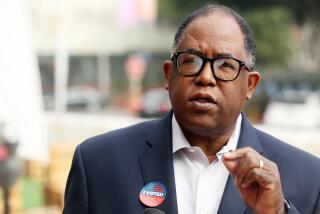Red Light for Reynolds
The struggle over William Bradford Reynolds was a struggle over the heart of the Civil Rights Act of 1964. The traditionalists won; the radical revisionists of the Reagan Administration are, for the present, routed. Reynolds’ views, and the Administration’s, having been repudiated by the Senate Judiciary Committee, means he has no choice but to resign his post as assistant attorney general for civil rights.
President Reagan may insist that Reynolds’ opinions are but those of the Administration, but the rigid zeal and evident pleasure with which Reynolds promoted them threw the issue into sharp focus. Does or does not the United States still hold to the commitments of 21 years ago? The President may well now wish that he had had an advocate who was less single-minded.
During Reynolds’ four years as the top lawyer for civil-rights enforcement, he fought to dismantle protections against discrimination in employment, housing, voting and education. For that came his rejection for promotion to the third job in the Justice Department, though some senators used as a cover his sometimes-evasive answers to their questions.
You cannot hope that Reagan, who never understood why the civil-rights revolution was necessary in this country, will change his attitude now. But you can hope that he can somehow find someone who is less enthusiastic than Reynolds about returning to the days when black meant “Stand back.” Reynolds’ pious legalisms about equality blurred but did not conceal his contempt for this nation’s great reform that is bit by bit removing all the invidious distinctions of race and sex, of color and religion and origin. Reagan and Reynolds are wrong. We shall never go back; we must only go forward.
More to Read
Get the L.A. Times Politics newsletter
Deeply reported insights into legislation, politics and policy from Sacramento, Washington and beyond. In your inbox three times per week.
You may occasionally receive promotional content from the Los Angeles Times.










